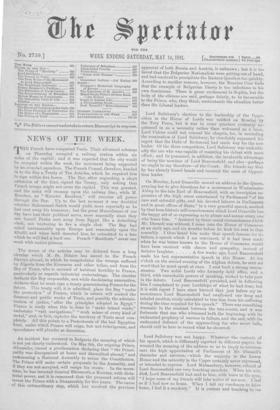On Monday, Lord Granville moved an address to the Queen,
praying her to give directions for a monument in Westminster Abbey to the late Earl of Beaconsfield, with an inscription ex- pressive of the high sense entertained by Parliament "of his rare and splendid gifts, and his devoted labours in Parliament and in great offices of State," in a very graceful speech, marked by that keen historic self-consciousness which Lord Granville has the happy art of so expressing as to please and amuse every one who bears him. " Assisted by those social circumstances which Mr. Disraeli was without, I came into the House of Commons at an early age, and six months before ho took his seat in that assembly. I thus heard him make that speech famous for its failure, a speech which I am convinced, if it had been made when Ile was better known to the House of Commons, would have been received with cheers and sympathy, instead of
derisive laughter A few weeks ago, Lord Beaconsfield made his last argumentative speech in this House. At ten o'clock on the second evening of the Afghan debate, he sent Ina word that he must speak at once. I sent back a strong remon- strate°. Two noble Lords who formerly held office, and a third, with remarkable powers of speaking, wished to take part in the debate. Lord Beaconsfield persisted, and in following him I complained to your Lordships of what he had done, but it is with regret I have since learned that just before my re- monstrance Lord Beaconsfield had swallowed one drug and inhaled another, nicely calculated to free him from his suffering during the time required for his speech." There was something dramatic in the contrast between the two events, and it was fortunate that one who witnessed both the beginning, with its undaunted prophecy of success in failure, and the end, with its undaunted defiance of the approaching foe who never fails, should still be here to record what he observed.






































